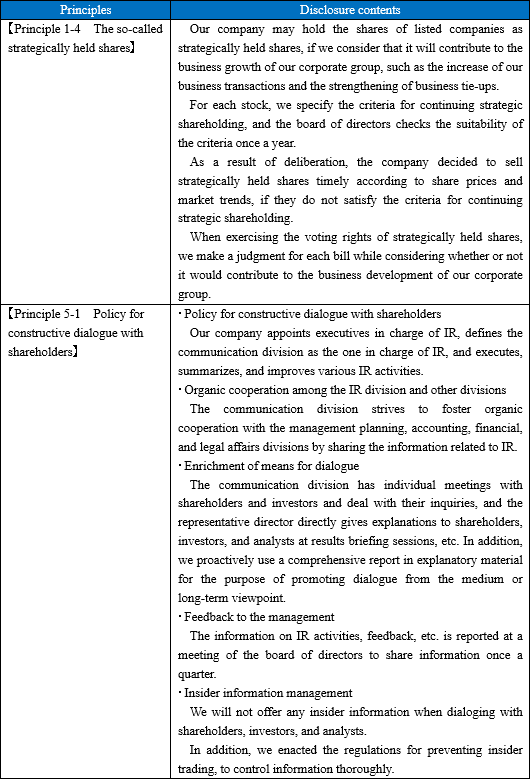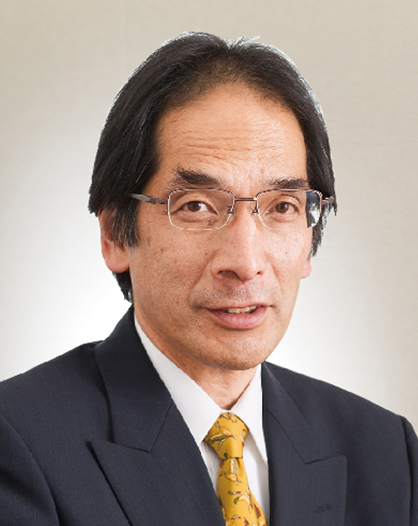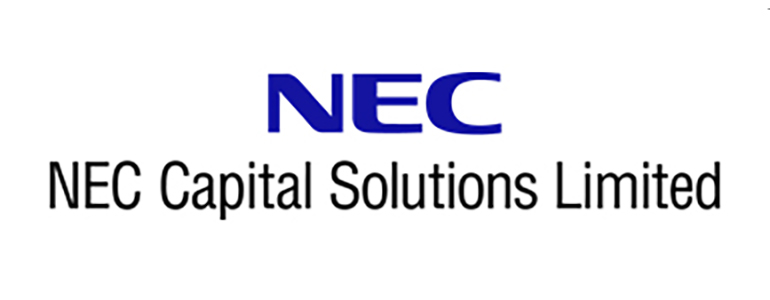NEC Capital Solutions Limited is the only financial service company that belongs to the NEC Group in Japan. The Leasing and Installment Sales Business, mainly finance lease, accounts for just over 70% of total sales. Its significant characteristics and strengths include the stable business base underpinned by the relation with NEC, which has strengths in governmental offices and municipalities, and the integration between ICT and finance. The company aims to achieve CSV-based management in which it can create desirable economic value as an enterprise while creating social value through the business itself.
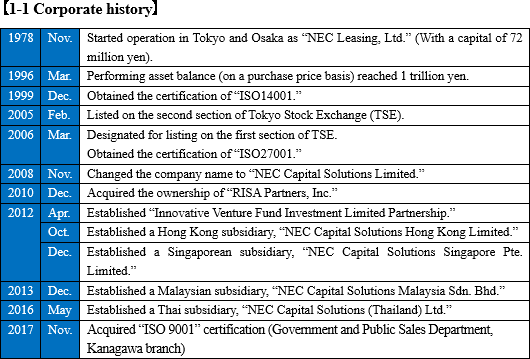

Each employee understands their own mission, value, and vision based on the corporate philosophy, aiming for making them the best and trustworthy partner of each customer.
In addition, the company developed the following group vision in October 2013.
The vision is the aim put into words as what the entire Group will share and pursue for the next 10 years.
As it is anticipated that the external and internal environments surrounding the company will show constant changes, the company deems the vision as anchorage which makes it steadfast in business operation under any circumstances.
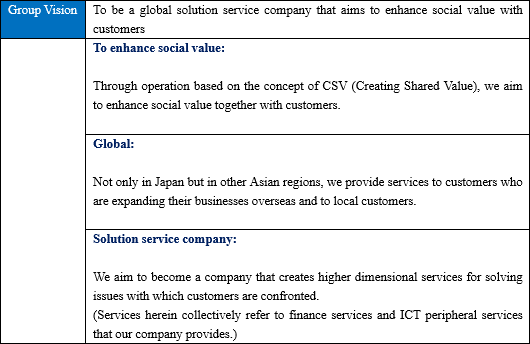
In the group vision, the company has adopted a plan to carry out business operation based on the concept of CSV (Creating Shared Value) which is defined as creation of economic value that should be pursued as a company, as well as creation of social value, through the business itself.
Lately, in order for a company to exist permanently, it is required from them to create social value that contributes to the creation of a more livable society. Accordingly, NEC Capital Solutions clarifies a 10-year vision and aims for sustainable growth with a central focus given on the idea of corporate operation based on the concept of CSV.
The company has conducted businesses by being conscious highly of the concept of CSR (Corporate Social Responsibility). One example is that taking notice sooner than any other companies that the leasing business is a resource recycling-based industry, the company has engaged in processing of articles whose lease periods have expired based on the principle of 3Rs (Reduce, Reuse, and Recycle) and the augmentation in sales of the "eco-lease" field which leases environmentally-friendly equipment.
In addition, in the business targeting government agencies and municipalities, which is its area of specialty, NEC Capital Solutions provides support for the establishment of social infrastructure itself.
After gaining a foothold through the above-mentioned bases, the company will take one step ahead of the idea of CSR to make contributions to the improvement of social value through its business itself.
 1-3 Market environment, etc.
1-3 Market environment, etc. ◎ System of lease
◎ System of lease
The following describes the system of "lease transactions" that account for a majority of net sales of NEC Capital Solutions:

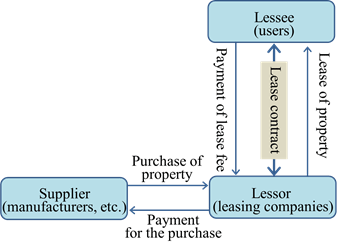
In Japan, lease transactions are divided into 2 categories: "finance lease" and "operating lease," in accordance with the Accounting Standard for Lease Transactions.
<Finance lease>
Finance lease refers to leases that satisfy the following 2 requirements:
① Cancellation of a lease contract during a lease period is banned (prohibition of midterm cancellation).
② Almost all (over 90%) of the total amount of the price of a property and ancillary expenses (procurement interest, tax, insurance, commissions, etc.) is recouped through lease fees (full payout). In other words, the total amount of lease fees is composed of "the price of a property + ancillary expenses."
Diverse advantages will be brought to users, including labor-saving clerical and administrative tasks, cost reduction, and largely reduced initial costs.
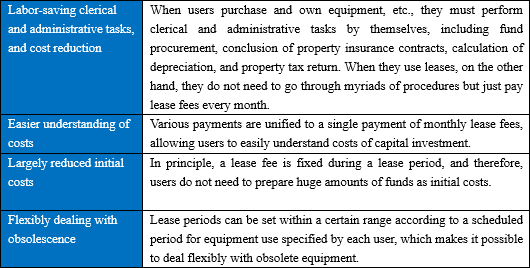
Finance lease transactions are further divided into "non-ownership-transfer finance lease" and "ownership-transfer finance lease."
While "ownership-transfer finance lease" is limited, being composed of leases with conditions for ownership transfer, leases with purchase options, and leases of special specification properties, "non-ownership-transfer finance lease" refers to finance leases other than "ownership-transfer finance lease" and accounts for a majority of the finance lease transactions.
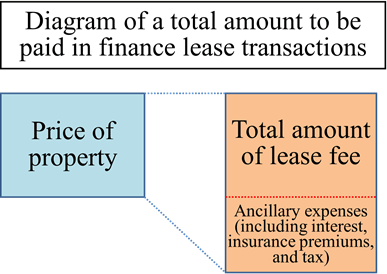 <Operating lease>
<Operating lease>
Operating lease refers to leases other than finance leases.
In other words, operating lease is leases that do not meet one or either of the above-mentioned 2 requirements, and it usually indicates leases with a system that does not satisfy the requirement of "② full payout."
Operating lease has a lease scheme where the potential future value of equipment or a facility is estimated in advance.
Before an operating lease transaction is conducted, the value of a used property for lease at the time of expiration of its lease contract (salvage value) is estimated and then a lease fee is determined based on the amount calculated by subtracting the salvage value from the property price.
Regarding properties for which users desire operating lease transactions, their salvage value is determined based on their future market value which leasing companies have estimated by taking account of "whether or not a used property market exists and the market trend if the market exists," "economic circumstances," "past results of the relevant property," and "use conditions by users."
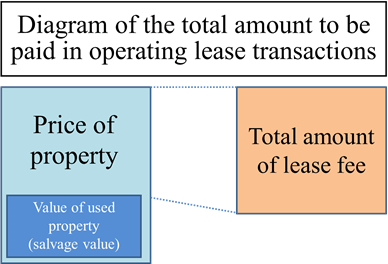
Accordingly, the total amount of lease fees in operating lease transactions is smaller than the property price and cheaper than the total lease fees in finance lease transactions.
NEC Capital Solutions has engaged mainly in "finance lease" transactions but can deal with operating lease transactions for some aircrafts and buildings.
◎ Market trend and scale
The statistics released by Japan Leasing Association has shown that the volume of lease transactions (breaking base) in fiscal 2017 was about 4.8 trillion yen, which indicates a considerable decline due to the new Accounting Standard for Lease Transactions (*) introduced in April 2008 and the impact of the financial crisis in September 2008. However, the transaction volume has fluctuated around 5 trillion yen in recent years because the new Accounting Standard does not apply to medium- to small-sized companies and finance lease transactions other than off-balance sheet transactions mentioned above still have attractive advantages.
Meanwhile, competition has intensified among leasing companies, and local financial institutions, who are struggling with a deteriorated business environment attributed to the introduction of the negative interest rate policy, started to proactively grant loans to parties which were not included in their target users, including customers of leasing companies, which has resulted in hightened competition.
It has been required for leasing companies to create differentiating factors such as diverse services and high added value.
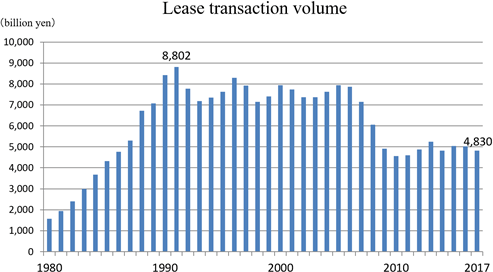 (*) New Accounting Standard for Lease Transactions: Introduced in April 2008. Before the introduction, it was allowed not to record non-ownership-transfer finance lease transactions (off-balance sheet) because such transactions do not involve transfer of ownership; however, the new Accounting Standard has in principle banned off-balance sheet transactions and required sales and purchase accounting (on-balance sheet). As a rule, "lease assets" and "lease liabilities" are recorded in a balance sheet at the time of commencement of a lease. In addition, depreciation regarding lease assets and interest rate equivalents regarding lease liabilities are posted on profit and loss statements, respectively.
Companies to which the new standard applies include listed companies to which Financial Instruments and Exchange Act applies and their subsidiaries and associated companies, and large corporations as stipulated in the Companies Act (with capital being over 500 million yen or total liabilities being over 20 billion yen).
Medium- to small-sized companies are allowed to continue the conventional lease accounting (off-balance sheet). Companies with capital being less than 500 million yen or total liabilities being less than 20 billion yen, including stock companies, special limited liability companies, general partnership companies, limited partnership companies, and limited liability companies, are not subject to the new Accounting Standard for Lease Transactions and are allowed to conduct the conventional lease accounting (off-balance sheet).
(*) New Accounting Standard for Lease Transactions: Introduced in April 2008. Before the introduction, it was allowed not to record non-ownership-transfer finance lease transactions (off-balance sheet) because such transactions do not involve transfer of ownership; however, the new Accounting Standard has in principle banned off-balance sheet transactions and required sales and purchase accounting (on-balance sheet). As a rule, "lease assets" and "lease liabilities" are recorded in a balance sheet at the time of commencement of a lease. In addition, depreciation regarding lease assets and interest rate equivalents regarding lease liabilities are posted on profit and loss statements, respectively.
Companies to which the new standard applies include listed companies to which Financial Instruments and Exchange Act applies and their subsidiaries and associated companies, and large corporations as stipulated in the Companies Act (with capital being over 500 million yen or total liabilities being over 20 billion yen).
Medium- to small-sized companies are allowed to continue the conventional lease accounting (off-balance sheet). Companies with capital being less than 500 million yen or total liabilities being less than 20 billion yen, including stock companies, special limited liability companies, general partnership companies, limited partnership companies, and limited liability companies, are not subject to the new Accounting Standard for Lease Transactions and are allowed to conduct the conventional lease accounting (off-balance sheet).
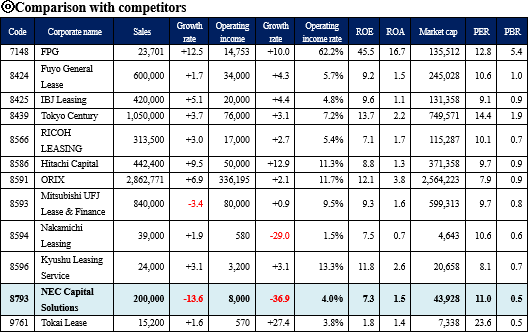 *The sales and operating income are forecasts for this term with the unit being million yen. Forecast of business results as of May 23, 2018.
ROE and ROA are the results from the previous term with the unit being %.
The market cap, PER (estimate), and PBR (results) are the closing price on May 23 with the unit of PER being million yen and PBR being times.
The earnings values for ORIX are for the previous year's results
*The sales and operating income are forecasts for this term with the unit being million yen. Forecast of business results as of May 23, 2018.
ROE and ROA are the results from the previous term with the unit being %.
The market cap, PER (estimate), and PBR (results) are the closing price on May 23 with the unit of PER being million yen and PBR being times.
The earnings values for ORIX are for the previous year's results
Many lease companies' PBR values are under 1 times.
In addition to increasing profitability, it is essential for the company to raise investor awareness and promote an understanding of its characteristics, strengths, competitive advantages, and path to sustainable profit expansion.
 1-4 Business contents
1-4 Business contents (1) Segments
(1) Segments
The company's business consists of the following 4 segments: Leasing and Installment Sales Business, Finance Business, RISA Business, and Other Business.
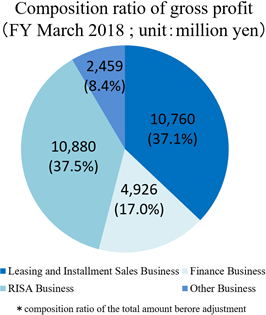 ◎ Leasing and Installment Sales Business
◎ Leasing and Installment Sales Business
In this segment, the company engages in the Leasing Business and the Installment Sales Business.
In addition to finance lease transactions, the company provides various services, including "maintenance lease" which is a scheme coming with maintenance contracts, "operating lease" where off-balance sheet transactions are allowed, and the "N rental" service which is the remaining value setting type and cancellable operating lease transactions covering ICT equipment.
In general, operating lease transactions deal with assets that can be sold at a certain price even after lease contracts have ended because a decline in their value due to lapse of time is gradual, including aircraft and vessels, but ICT equipment which becomes obsolete quickly, such as computers, is difficult to be subject to operating lease transactions. The company's "N renta" l lease service, however, has solved the issue by increasing the value of ICT equipment through regeneration and sold such regenerated equipment to the global used product market.
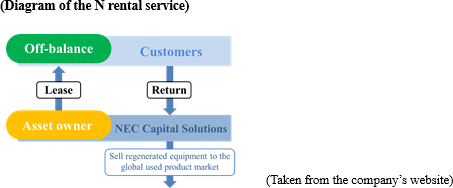
As described above, it is certain that leased products are returned regardless of lease types. Therefore, NEC Capital Solutions deems lease transactions as a service that contributes to a resource recycling-based society and, in accordance with the principle of 3Rs (mainly Reuse), regenerates ICT equipment with lease contracts expired which can be sold again. This has led to creation of a resource recycling-based society.
In the Installment Sales Business, according to users' financial needs and needs for possessing facilities, the company purchases facilities on their behalf and sells such facilities by installments to them. Costs of such purchase, interest, and the like are collected in installments.
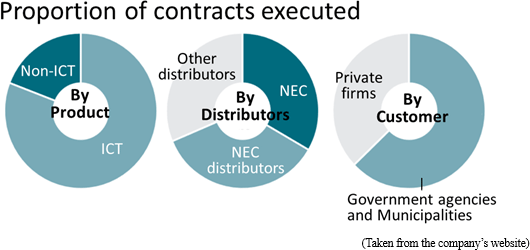
Lately, the company endeavors to diversify operating assets that it handles, including renewable energy related facilities such as solar panels, buildings, and aircraft.
◎ Finance Business
This segment is composed mainly of "business loans" and "factoring."
Principally, business loans refer to "provision of a liquidation program for various receivables" and "provision of structured financing schemes for capital investment."
Factoring is a service that realizes recovery of accounts receivable as quick as possible and alleviates burdens of fund procurement imposed on companies.
These services take another role as an opportunity to link new customers with its major Leasing Business.
The company engages in a business of securities investment as well.
◎ RISA Business
This segment is a business of RISA Partners, Inc., (RISA for the rest) which was acquired as a consolidated subsidiary in December 2010 with the aim of diversifying NEC Capital Solutions' financial services.
The company provides client companies with solutions to their management issues in the form of "investment and loans" which provides financial support and in the form of "advisory" which gives advice from the professional perspectives mainly in the fields of finance and real estate.
The capabilities for providing one-stop solutions to a wide range of issues, including support for business growth, improvement of capital efficiency, achievement of liability soundness, and effective utilization of real estate, are the unique strength of the company with a number of experts in various special fields.
What the company is particularly skilled at is support for revitalization of local companies by taking advantage of its network with more than 180 regional financial institutions.
Using that strength, NEC Capital Solutions set up "Tourism Revitalization Mother Fund" in March 2014 jointly with Development Bank of Japan Inc. and Regional Economy Vitalization Corporation of Japan.
The aim of the fund is to revitalize the tourism industry all across Japan and to invest funds in a broad range of tourism related businesses, including hotels, restaurants, local manufacture and sale of products, and local traffic. The company strives to support economic growth of Japan as a tourism-oriented country by contributing to economic revitalization through rich tourism resources in each region all over Japan.
◎ Other Business
In addition to posting of various fee revenues such as strucruting fees for structured finance, this segment includes a service where the company engages, on behalf of customers, in trades of used properties with lease contracts expired or cancelled that the company has owned in its Leasing Business, collection of maintenance fees, improvement of business efficiency regarding customers' loan asset management, response to customers' needs for outsourcing, and the like.
Fees in the solar power generation business, PFI business, and health-care business, which the company decided to strive for in the course of searching for new needs from the CSV perspective and propelling commercialization are also contained in this segment.
(ICT related business)
The company supports optimization of operation and management of customers' ICT assets at each step of the lifecycle of ICT equipment, ranging from introduction to use and disposal, with the BPO (Business Process Outsourcing) format cloud service.
In addition, Reboot Technology Services and Capitech Limited, a subsidiary of NEC Capital Solutions, regenerates used ICT equipment whose lease contracts have ended and sells regenerated equipment via its own sales channels including overseas.
(PFI business)
PFI (Private Finance Initiative) refers to improving social capital by using private funds; in other words, it is a public-private collaborative project for constructing, maintaining, managing, and operating public facilities, etc. by using private funds, management skills, and technical capabilities.
As it is generally required to structure fund procurement through project finance, dedicated staff establishes a structure best suited to a business in order to provide services from the business operators' perspective, including assistance in low-interest fund procurement and production of written proposal for government agencies and municipalities.
(Health-care business)
This business is developed mainly with "health-care REITs," real estate investment trusts, where funds raised from investors are invested specially in health-care facilities.
(Energy business)
As one of the strategies of corporate operation based on the idea of CSV, the company engages not only in the solar power generation business through SPCs (specific purpose companies) but also in the operation of regional power producers and suppliers (PPSs) and in the purchase and sale of electricity.
In October 2015, under the concept of "local production and consumption of energy," the company established a regional PPS, "Hamamatsu New Electric Power Co.," jointly with Hamamatsu City, NTT FACILITIES, INC., and financial institutions and private companies in the city.
Hamamatsu New Electric Power Co. purchases electricity from solar power generation companies in Hamamatsu City and sells the electricity principally to public institutions including elementary and junior high schools in the city. Local consumption of locally produced energy enables stable supply of electricity without relying on supply from the outside of the city, and besides, funds and resources for electricity supply are circulated within the city, revitalizing the local economy.
2. Overseas business expansion
NEC Capital Solutions has propelled business expansion overseas with local subsidiaries currently established in Hong Kong, Singapore, Malaysia, and Thailand.
Quite a few efforts with respect to preparation and time are generally demanded for the establishment of overseas bases; however, as NEC has already focused on some overseas regions and expanded its business there, the company decided to provide financial support to such overseas markets in response to the overseas business strategies of NEC, in order to mitigate risks.
The company plans to expand its business, including dealing with local companies and providing assistance for Japanese companies aiming to enter the Asian markets.
 1-5 Characteristics and strengths
1-5 Characteristics and strengths ① Stable business foundation based on the relationship with NEC
① Stable business foundation based on the relationship with NEC
As one of the affiliated companies of the NEC Group, NEC Capital Solutions is the only finance services company in Japan and has shared the customer base with NEC since its establishment. The customer base is sound, with the main customers being government agencies and municipalities (which account for over 50% of its customers) , and large companies.
In addition, nearly two-third of the volume of contracts executed is attributed to NEC and NEC affliated distributors. Regarding NEC products, the company provides leases in combination with NEC's products and services, which is unique to a manufacturer-affiliated company, including maintenance leases and vendor finance programs.
The company has propelled the establishment of a strategic partnership with NEC.
Regarding proposal for systems to customers by NEC, NEC Capital Solutions has taken part in the proporsal activities from earlier stages, given consideration to sales techniques, and made proposals as a member of “Team NEC."
Both companies enjoy advantages: NEC can make proposal which distinguishes it from competitors, and NEC Capital Solutions can enter into negotiations without vying with other finance services companies.
Lease contracts are a business involving transactions with customers for a long period of time with the average contract period being 5 years.
Transactions between NEC Capital Solutions and customers continue even after manufacturers sold equipment, which allows the company to understand new issues which customers are faced with. Through such relationships with customers, NEC Capital Solutions in some cases introduces NEC to new business opportunities.
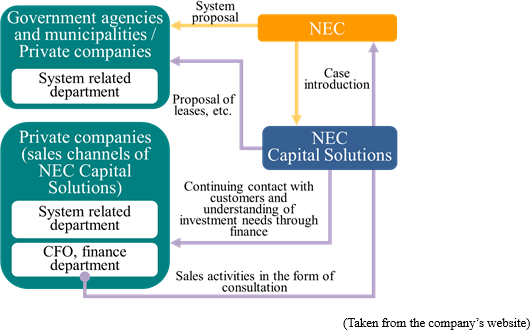 ② Integration between "ICT" and "finance"
② Integration between "ICT" and "finance"
Although the company leases various facilities, due to its background as a financial company established for the purpose of pushing up sales of NEC, the ratio of lease transactions of ICT products is large, accounting for almost 80%.
With such a backbone, the keyword characterizing the presence of NEC Capital Solutions among a myriad of leasing companies is 'integration between "ICT" and "finance."'
One service that represents the company which has integrated "ICT" and "finance" is "PIT managed Service."
This is a BPO format cloud service that provides multifarious one-stop services to manage lifecycles "from procurement and development to operational management and asset disposal" of ICT assets, including a variety of devices such as computers and software, which require a lot of settings and management before use.
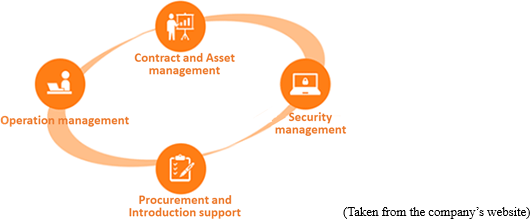
The company deals flexibly with multiple devices including smartphones and tablets as well as computers and handles equipment manufactured by not only NEC but also various manufacturers in order to make the best proposal according to each circumstance of customers.
In addition, the cloud service into which cutting-edge technology and services are incorporated contributes to the curtailment of total cost and the maintenance of quality.
Besides, the company operates a service desk for providing a variety of services by taking into consideration compliance and security and undertaking back-office functions on behalf of each customer.
With the sound business foundation formed through a strategic collaboration with NEC, NEC Capital Solutions provides a wide range of financial solutions by using its profound knowledge of ICT equipment.
③ CSV-based management
Another keyword that characterizes NEC Capital Solutions is CSV-based management.
The company considered it important to set a policy that always remains steadfast in order to clarify the significance of the company's presence and to pursue sustainable growth, and thus, adopted the idea of CSV in October 2013.
As mentioned above, the concept of CSV is that a business itself creates not only social value but also economic value that a company should pursue.
Prof. Michael Porter, who is known for his book "Competitive Strategy," put forward the idea of CSV on Harvard Business Review in 2011.
While CSR, which is widely known as responsibilities and activities toward society, refers to activities performed around companies' regular business, including compliance, environmental management, and philanthropy (activities contributing to society), CSV attaches weight to strategic expansion of the regular business itself.
It is starting to be understood that CSV is a new movement for taking one step ahead of the idea of CSR and boost corporate value, business value, and competitiveness through the realization of social value.
Example of CSV-based Management Initiative ①: "Environment/reconstruction support syndicated loan"
The "environment/reconstruction support syndicated loan" program aims to provide support for companies oriented toward environmentally-friendly business, and reconstruction of areas damaged by the Great East Japan Earthquake. In collaboration with Development Bank of Japan Inc., syndicated loans are arranged through cooperation from financial institutions all across Japan and funds are invested in projects in accordance with each purport.
The company began arranging syndicated loans in 2012, and has completed seven of them so far. Since the launch in 2012, the initiative has earned high reputation and was awarded the "Grand Prize/Minister of the Environment Prize (cooperative project section)," which is the best prize in the 15th annual Green Purchasing Awards in October, 2013.
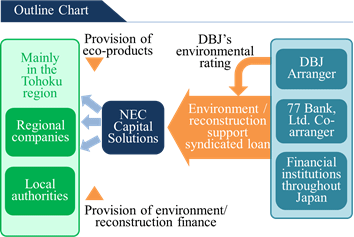 Example of CSV-based Management Initiative ②: "Development project of charging infrastructure for next-generation automobiles"
Example of CSV-based Management Initiative ②: "Development project of charging infrastructure for next-generation automobiles"
The NEC Group has propelled a "development project of charging infrastructure for next-generation automobiles" in order to develop infrastructure, such as charging stations, indispensable for popularizing environmentally-friendly next-generation automobiles including electric vehicles (EVs) and plug-in hybrid vehicles (PHVs).
In the project where the NEC Group makes proposal to companies and local authorities operating facilities that can deal with large-scale introduction of such infrastructure, such as large commercial complexes and public institutions which will be the NEC Group's customers, the company has taken a role in finance related tasks and suggested a system for cutting down on initial costs at the time of introduction as close to zero as possible by utilizing subsidies from the government as well as using leased chargers and the like.
Operation has begun at several facilities principally in the Tokyo Metropolitan area.
The concept of CSV-based management has taken deep root in the company as a result of the efforts at broadening the understanding of the idea and penetrating it through discussion among all the employees about what should be done in each department and discussion by the president with all the departments including branch offices. With the establishment of a new Medium-term Plan 2017 deemed as a turning point, the company plans to remind its employees of the concept and brush up their understanding.
With the establishment of the new Medium-term Plan 2017, the president took the opportunity to once again discuss its concept with all employees and brush up their understanding.

Although the net income margin increased about 1% in FY 3/18, it is expected to decline 0.6 points this term.
Because it is necessary to keep a fixed scale of lease assets, it is hard to raise the total asset turnover in this type of business, but it is desirable to raise the ROE by steadily improving margins.
 1-7 Shareholder return
1-7 Shareholder return
The Leasing Business, which is the company's core business, is based on a business model with long contract periods during which the company receives lease fees on a regular basis; therefore, its business results remain stable. Based on such business characteristics, the company gives priority to stable distribution of dividends.
The dividend has been 44 yen/share since the company was listed, but in FY 3/18 it was increased for the first time to 50 yen/share.
In addition, it has established a shareholder benefit plan where benefits are granted once a year to shareholders who hold the company's shares as of the end of every March. The company will send out shareholder benefits in early July.
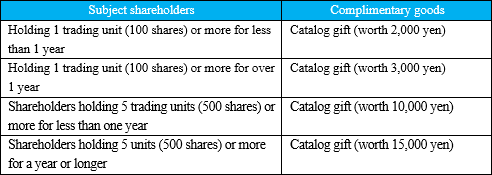
Also, if shareholders wish to make a donation instead of receiving benefits, and if they offer to decline the complimentary goods in advance, the company will donate money equal to the price of the goods to organizations supporting the victims of the Great East Japan Earthquake.
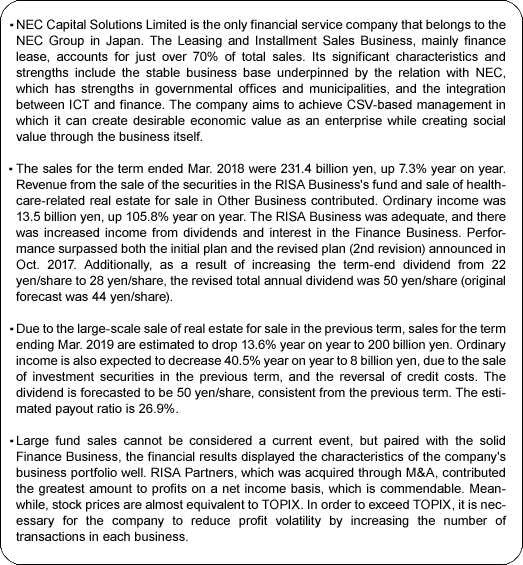

 Each employee understands their own mission, value, and vision based on the corporate philosophy, aiming for making them the best and trustworthy partner of each customer.
In addition, the company developed the following group vision in October 2013.
The vision is the aim put into words as what the entire Group will share and pursue for the next 10 years.
As it is anticipated that the external and internal environments surrounding the company will show constant changes, the company deems the vision as anchorage which makes it steadfast in business operation under any circumstances.
Each employee understands their own mission, value, and vision based on the corporate philosophy, aiming for making them the best and trustworthy partner of each customer.
In addition, the company developed the following group vision in October 2013.
The vision is the aim put into words as what the entire Group will share and pursue for the next 10 years.
As it is anticipated that the external and internal environments surrounding the company will show constant changes, the company deems the vision as anchorage which makes it steadfast in business operation under any circumstances.
 In the group vision, the company has adopted a plan to carry out business operation based on the concept of CSV (Creating Shared Value) which is defined as creation of economic value that should be pursued as a company, as well as creation of social value, through the business itself.
Lately, in order for a company to exist permanently, it is required from them to create social value that contributes to the creation of a more livable society. Accordingly, NEC Capital Solutions clarifies a 10-year vision and aims for sustainable growth with a central focus given on the idea of corporate operation based on the concept of CSV.
The company has conducted businesses by being conscious highly of the concept of CSR (Corporate Social Responsibility). One example is that taking notice sooner than any other companies that the leasing business is a resource recycling-based industry, the company has engaged in processing of articles whose lease periods have expired based on the principle of 3Rs (Reduce, Reuse, and Recycle) and the augmentation in sales of the "eco-lease" field which leases environmentally-friendly equipment.
In addition, in the business targeting government agencies and municipalities, which is its area of specialty, NEC Capital Solutions provides support for the establishment of social infrastructure itself.
After gaining a foothold through the above-mentioned bases, the company will take one step ahead of the idea of CSR to make contributions to the improvement of social value through its business itself.
In the group vision, the company has adopted a plan to carry out business operation based on the concept of CSV (Creating Shared Value) which is defined as creation of economic value that should be pursued as a company, as well as creation of social value, through the business itself.
Lately, in order for a company to exist permanently, it is required from them to create social value that contributes to the creation of a more livable society. Accordingly, NEC Capital Solutions clarifies a 10-year vision and aims for sustainable growth with a central focus given on the idea of corporate operation based on the concept of CSV.
The company has conducted businesses by being conscious highly of the concept of CSR (Corporate Social Responsibility). One example is that taking notice sooner than any other companies that the leasing business is a resource recycling-based industry, the company has engaged in processing of articles whose lease periods have expired based on the principle of 3Rs (Reduce, Reuse, and Recycle) and the augmentation in sales of the "eco-lease" field which leases environmentally-friendly equipment.
In addition, in the business targeting government agencies and municipalities, which is its area of specialty, NEC Capital Solutions provides support for the establishment of social infrastructure itself.
After gaining a foothold through the above-mentioned bases, the company will take one step ahead of the idea of CSR to make contributions to the improvement of social value through its business itself.
 1-3 Market environment, etc.
1-3 Market environment, etc. ◎ System of lease
The following describes the system of "lease transactions" that account for a majority of net sales of NEC Capital Solutions:
◎ System of lease
The following describes the system of "lease transactions" that account for a majority of net sales of NEC Capital Solutions:

 In Japan, lease transactions are divided into 2 categories: "finance lease" and "operating lease," in accordance with the Accounting Standard for Lease Transactions.
<Finance lease>
Finance lease refers to leases that satisfy the following 2 requirements:
① Cancellation of a lease contract during a lease period is banned (prohibition of midterm cancellation).
② Almost all (over 90%) of the total amount of the price of a property and ancillary expenses (procurement interest, tax, insurance, commissions, etc.) is recouped through lease fees (full payout). In other words, the total amount of lease fees is composed of "the price of a property + ancillary expenses."
Diverse advantages will be brought to users, including labor-saving clerical and administrative tasks, cost reduction, and largely reduced initial costs.
In Japan, lease transactions are divided into 2 categories: "finance lease" and "operating lease," in accordance with the Accounting Standard for Lease Transactions.
<Finance lease>
Finance lease refers to leases that satisfy the following 2 requirements:
① Cancellation of a lease contract during a lease period is banned (prohibition of midterm cancellation).
② Almost all (over 90%) of the total amount of the price of a property and ancillary expenses (procurement interest, tax, insurance, commissions, etc.) is recouped through lease fees (full payout). In other words, the total amount of lease fees is composed of "the price of a property + ancillary expenses."
Diverse advantages will be brought to users, including labor-saving clerical and administrative tasks, cost reduction, and largely reduced initial costs.
 Finance lease transactions are further divided into "non-ownership-transfer finance lease" and "ownership-transfer finance lease."
While "ownership-transfer finance lease" is limited, being composed of leases with conditions for ownership transfer, leases with purchase options, and leases of special specification properties, "non-ownership-transfer finance lease" refers to finance leases other than "ownership-transfer finance lease" and accounts for a majority of the finance lease transactions.
Finance lease transactions are further divided into "non-ownership-transfer finance lease" and "ownership-transfer finance lease."
While "ownership-transfer finance lease" is limited, being composed of leases with conditions for ownership transfer, leases with purchase options, and leases of special specification properties, "non-ownership-transfer finance lease" refers to finance leases other than "ownership-transfer finance lease" and accounts for a majority of the finance lease transactions.
 <Operating lease>
Operating lease refers to leases other than finance leases.
In other words, operating lease is leases that do not meet one or either of the above-mentioned 2 requirements, and it usually indicates leases with a system that does not satisfy the requirement of "② full payout."
Operating lease has a lease scheme where the potential future value of equipment or a facility is estimated in advance.
Before an operating lease transaction is conducted, the value of a used property for lease at the time of expiration of its lease contract (salvage value) is estimated and then a lease fee is determined based on the amount calculated by subtracting the salvage value from the property price.
Regarding properties for which users desire operating lease transactions, their salvage value is determined based on their future market value which leasing companies have estimated by taking account of "whether or not a used property market exists and the market trend if the market exists," "economic circumstances," "past results of the relevant property," and "use conditions by users."
<Operating lease>
Operating lease refers to leases other than finance leases.
In other words, operating lease is leases that do not meet one or either of the above-mentioned 2 requirements, and it usually indicates leases with a system that does not satisfy the requirement of "② full payout."
Operating lease has a lease scheme where the potential future value of equipment or a facility is estimated in advance.
Before an operating lease transaction is conducted, the value of a used property for lease at the time of expiration of its lease contract (salvage value) is estimated and then a lease fee is determined based on the amount calculated by subtracting the salvage value from the property price.
Regarding properties for which users desire operating lease transactions, their salvage value is determined based on their future market value which leasing companies have estimated by taking account of "whether or not a used property market exists and the market trend if the market exists," "economic circumstances," "past results of the relevant property," and "use conditions by users."
 Accordingly, the total amount of lease fees in operating lease transactions is smaller than the property price and cheaper than the total lease fees in finance lease transactions.
NEC Capital Solutions has engaged mainly in "finance lease" transactions but can deal with operating lease transactions for some aircrafts and buildings.
◎ Market trend and scale
The statistics released by Japan Leasing Association has shown that the volume of lease transactions (breaking base) in fiscal 2017 was about 4.8 trillion yen, which indicates a considerable decline due to the new Accounting Standard for Lease Transactions (*) introduced in April 2008 and the impact of the financial crisis in September 2008. However, the transaction volume has fluctuated around 5 trillion yen in recent years because the new Accounting Standard does not apply to medium- to small-sized companies and finance lease transactions other than off-balance sheet transactions mentioned above still have attractive advantages.
Meanwhile, competition has intensified among leasing companies, and local financial institutions, who are struggling with a deteriorated business environment attributed to the introduction of the negative interest rate policy, started to proactively grant loans to parties which were not included in their target users, including customers of leasing companies, which has resulted in hightened competition.
It has been required for leasing companies to create differentiating factors such as diverse services and high added value.
Accordingly, the total amount of lease fees in operating lease transactions is smaller than the property price and cheaper than the total lease fees in finance lease transactions.
NEC Capital Solutions has engaged mainly in "finance lease" transactions but can deal with operating lease transactions for some aircrafts and buildings.
◎ Market trend and scale
The statistics released by Japan Leasing Association has shown that the volume of lease transactions (breaking base) in fiscal 2017 was about 4.8 trillion yen, which indicates a considerable decline due to the new Accounting Standard for Lease Transactions (*) introduced in April 2008 and the impact of the financial crisis in September 2008. However, the transaction volume has fluctuated around 5 trillion yen in recent years because the new Accounting Standard does not apply to medium- to small-sized companies and finance lease transactions other than off-balance sheet transactions mentioned above still have attractive advantages.
Meanwhile, competition has intensified among leasing companies, and local financial institutions, who are struggling with a deteriorated business environment attributed to the introduction of the negative interest rate policy, started to proactively grant loans to parties which were not included in their target users, including customers of leasing companies, which has resulted in hightened competition.
It has been required for leasing companies to create differentiating factors such as diverse services and high added value.
 (*) New Accounting Standard for Lease Transactions: Introduced in April 2008. Before the introduction, it was allowed not to record non-ownership-transfer finance lease transactions (off-balance sheet) because such transactions do not involve transfer of ownership; however, the new Accounting Standard has in principle banned off-balance sheet transactions and required sales and purchase accounting (on-balance sheet). As a rule, "lease assets" and "lease liabilities" are recorded in a balance sheet at the time of commencement of a lease. In addition, depreciation regarding lease assets and interest rate equivalents regarding lease liabilities are posted on profit and loss statements, respectively.
Companies to which the new standard applies include listed companies to which Financial Instruments and Exchange Act applies and their subsidiaries and associated companies, and large corporations as stipulated in the Companies Act (with capital being over 500 million yen or total liabilities being over 20 billion yen).
Medium- to small-sized companies are allowed to continue the conventional lease accounting (off-balance sheet). Companies with capital being less than 500 million yen or total liabilities being less than 20 billion yen, including stock companies, special limited liability companies, general partnership companies, limited partnership companies, and limited liability companies, are not subject to the new Accounting Standard for Lease Transactions and are allowed to conduct the conventional lease accounting (off-balance sheet).
(*) New Accounting Standard for Lease Transactions: Introduced in April 2008. Before the introduction, it was allowed not to record non-ownership-transfer finance lease transactions (off-balance sheet) because such transactions do not involve transfer of ownership; however, the new Accounting Standard has in principle banned off-balance sheet transactions and required sales and purchase accounting (on-balance sheet). As a rule, "lease assets" and "lease liabilities" are recorded in a balance sheet at the time of commencement of a lease. In addition, depreciation regarding lease assets and interest rate equivalents regarding lease liabilities are posted on profit and loss statements, respectively.
Companies to which the new standard applies include listed companies to which Financial Instruments and Exchange Act applies and their subsidiaries and associated companies, and large corporations as stipulated in the Companies Act (with capital being over 500 million yen or total liabilities being over 20 billion yen).
Medium- to small-sized companies are allowed to continue the conventional lease accounting (off-balance sheet). Companies with capital being less than 500 million yen or total liabilities being less than 20 billion yen, including stock companies, special limited liability companies, general partnership companies, limited partnership companies, and limited liability companies, are not subject to the new Accounting Standard for Lease Transactions and are allowed to conduct the conventional lease accounting (off-balance sheet).
 *The sales and operating income are forecasts for this term with the unit being million yen. Forecast of business results as of May 23, 2018.
ROE and ROA are the results from the previous term with the unit being %.
The market cap, PER (estimate), and PBR (results) are the closing price on May 23 with the unit of PER being million yen and PBR being times.
The earnings values for ORIX are for the previous year's results
Many lease companies' PBR values are under 1 times.
In addition to increasing profitability, it is essential for the company to raise investor awareness and promote an understanding of its characteristics, strengths, competitive advantages, and path to sustainable profit expansion.
*The sales and operating income are forecasts for this term with the unit being million yen. Forecast of business results as of May 23, 2018.
ROE and ROA are the results from the previous term with the unit being %.
The market cap, PER (estimate), and PBR (results) are the closing price on May 23 with the unit of PER being million yen and PBR being times.
The earnings values for ORIX are for the previous year's results
Many lease companies' PBR values are under 1 times.
In addition to increasing profitability, it is essential for the company to raise investor awareness and promote an understanding of its characteristics, strengths, competitive advantages, and path to sustainable profit expansion.
 1-4 Business contents
1-4 Business contents (1) Segments
The company's business consists of the following 4 segments: Leasing and Installment Sales Business, Finance Business, RISA Business, and Other Business.
(1) Segments
The company's business consists of the following 4 segments: Leasing and Installment Sales Business, Finance Business, RISA Business, and Other Business.
 ◎ Leasing and Installment Sales Business
In this segment, the company engages in the Leasing Business and the Installment Sales Business.
In addition to finance lease transactions, the company provides various services, including "maintenance lease" which is a scheme coming with maintenance contracts, "operating lease" where off-balance sheet transactions are allowed, and the "N rental" service which is the remaining value setting type and cancellable operating lease transactions covering ICT equipment.
In general, operating lease transactions deal with assets that can be sold at a certain price even after lease contracts have ended because a decline in their value due to lapse of time is gradual, including aircraft and vessels, but ICT equipment which becomes obsolete quickly, such as computers, is difficult to be subject to operating lease transactions. The company's "N renta" l lease service, however, has solved the issue by increasing the value of ICT equipment through regeneration and sold such regenerated equipment to the global used product market.
◎ Leasing and Installment Sales Business
In this segment, the company engages in the Leasing Business and the Installment Sales Business.
In addition to finance lease transactions, the company provides various services, including "maintenance lease" which is a scheme coming with maintenance contracts, "operating lease" where off-balance sheet transactions are allowed, and the "N rental" service which is the remaining value setting type and cancellable operating lease transactions covering ICT equipment.
In general, operating lease transactions deal with assets that can be sold at a certain price even after lease contracts have ended because a decline in their value due to lapse of time is gradual, including aircraft and vessels, but ICT equipment which becomes obsolete quickly, such as computers, is difficult to be subject to operating lease transactions. The company's "N renta" l lease service, however, has solved the issue by increasing the value of ICT equipment through regeneration and sold such regenerated equipment to the global used product market.
 As described above, it is certain that leased products are returned regardless of lease types. Therefore, NEC Capital Solutions deems lease transactions as a service that contributes to a resource recycling-based society and, in accordance with the principle of 3Rs (mainly Reuse), regenerates ICT equipment with lease contracts expired which can be sold again. This has led to creation of a resource recycling-based society.
In the Installment Sales Business, according to users' financial needs and needs for possessing facilities, the company purchases facilities on their behalf and sells such facilities by installments to them. Costs of such purchase, interest, and the like are collected in installments.
As described above, it is certain that leased products are returned regardless of lease types. Therefore, NEC Capital Solutions deems lease transactions as a service that contributes to a resource recycling-based society and, in accordance with the principle of 3Rs (mainly Reuse), regenerates ICT equipment with lease contracts expired which can be sold again. This has led to creation of a resource recycling-based society.
In the Installment Sales Business, according to users' financial needs and needs for possessing facilities, the company purchases facilities on their behalf and sells such facilities by installments to them. Costs of such purchase, interest, and the like are collected in installments.
 Lately, the company endeavors to diversify operating assets that it handles, including renewable energy related facilities such as solar panels, buildings, and aircraft.
◎ Finance Business
This segment is composed mainly of "business loans" and "factoring."
Principally, business loans refer to "provision of a liquidation program for various receivables" and "provision of structured financing schemes for capital investment."
Factoring is a service that realizes recovery of accounts receivable as quick as possible and alleviates burdens of fund procurement imposed on companies.
These services take another role as an opportunity to link new customers with its major Leasing Business.
The company engages in a business of securities investment as well.
◎ RISA Business
This segment is a business of RISA Partners, Inc., (RISA for the rest) which was acquired as a consolidated subsidiary in December 2010 with the aim of diversifying NEC Capital Solutions' financial services.
The company provides client companies with solutions to their management issues in the form of "investment and loans" which provides financial support and in the form of "advisory" which gives advice from the professional perspectives mainly in the fields of finance and real estate.
The capabilities for providing one-stop solutions to a wide range of issues, including support for business growth, improvement of capital efficiency, achievement of liability soundness, and effective utilization of real estate, are the unique strength of the company with a number of experts in various special fields.
What the company is particularly skilled at is support for revitalization of local companies by taking advantage of its network with more than 180 regional financial institutions.
Using that strength, NEC Capital Solutions set up "Tourism Revitalization Mother Fund" in March 2014 jointly with Development Bank of Japan Inc. and Regional Economy Vitalization Corporation of Japan.
The aim of the fund is to revitalize the tourism industry all across Japan and to invest funds in a broad range of tourism related businesses, including hotels, restaurants, local manufacture and sale of products, and local traffic. The company strives to support economic growth of Japan as a tourism-oriented country by contributing to economic revitalization through rich tourism resources in each region all over Japan.
◎ Other Business
In addition to posting of various fee revenues such as strucruting fees for structured finance, this segment includes a service where the company engages, on behalf of customers, in trades of used properties with lease contracts expired or cancelled that the company has owned in its Leasing Business, collection of maintenance fees, improvement of business efficiency regarding customers' loan asset management, response to customers' needs for outsourcing, and the like.
Fees in the solar power generation business, PFI business, and health-care business, which the company decided to strive for in the course of searching for new needs from the CSV perspective and propelling commercialization are also contained in this segment.
(ICT related business)
The company supports optimization of operation and management of customers' ICT assets at each step of the lifecycle of ICT equipment, ranging from introduction to use and disposal, with the BPO (Business Process Outsourcing) format cloud service.
In addition, Reboot Technology Services and Capitech Limited, a subsidiary of NEC Capital Solutions, regenerates used ICT equipment whose lease contracts have ended and sells regenerated equipment via its own sales channels including overseas.
(PFI business)
PFI (Private Finance Initiative) refers to improving social capital by using private funds; in other words, it is a public-private collaborative project for constructing, maintaining, managing, and operating public facilities, etc. by using private funds, management skills, and technical capabilities.
As it is generally required to structure fund procurement through project finance, dedicated staff establishes a structure best suited to a business in order to provide services from the business operators' perspective, including assistance in low-interest fund procurement and production of written proposal for government agencies and municipalities.
(Health-care business)
This business is developed mainly with "health-care REITs," real estate investment trusts, where funds raised from investors are invested specially in health-care facilities.
(Energy business)
As one of the strategies of corporate operation based on the idea of CSV, the company engages not only in the solar power generation business through SPCs (specific purpose companies) but also in the operation of regional power producers and suppliers (PPSs) and in the purchase and sale of electricity.
In October 2015, under the concept of "local production and consumption of energy," the company established a regional PPS, "Hamamatsu New Electric Power Co.," jointly with Hamamatsu City, NTT FACILITIES, INC., and financial institutions and private companies in the city.
Hamamatsu New Electric Power Co. purchases electricity from solar power generation companies in Hamamatsu City and sells the electricity principally to public institutions including elementary and junior high schools in the city. Local consumption of locally produced energy enables stable supply of electricity without relying on supply from the outside of the city, and besides, funds and resources for electricity supply are circulated within the city, revitalizing the local economy.
2. Overseas business expansion
NEC Capital Solutions has propelled business expansion overseas with local subsidiaries currently established in Hong Kong, Singapore, Malaysia, and Thailand.
Quite a few efforts with respect to preparation and time are generally demanded for the establishment of overseas bases; however, as NEC has already focused on some overseas regions and expanded its business there, the company decided to provide financial support to such overseas markets in response to the overseas business strategies of NEC, in order to mitigate risks.
The company plans to expand its business, including dealing with local companies and providing assistance for Japanese companies aiming to enter the Asian markets.
Lately, the company endeavors to diversify operating assets that it handles, including renewable energy related facilities such as solar panels, buildings, and aircraft.
◎ Finance Business
This segment is composed mainly of "business loans" and "factoring."
Principally, business loans refer to "provision of a liquidation program for various receivables" and "provision of structured financing schemes for capital investment."
Factoring is a service that realizes recovery of accounts receivable as quick as possible and alleviates burdens of fund procurement imposed on companies.
These services take another role as an opportunity to link new customers with its major Leasing Business.
The company engages in a business of securities investment as well.
◎ RISA Business
This segment is a business of RISA Partners, Inc., (RISA for the rest) which was acquired as a consolidated subsidiary in December 2010 with the aim of diversifying NEC Capital Solutions' financial services.
The company provides client companies with solutions to their management issues in the form of "investment and loans" which provides financial support and in the form of "advisory" which gives advice from the professional perspectives mainly in the fields of finance and real estate.
The capabilities for providing one-stop solutions to a wide range of issues, including support for business growth, improvement of capital efficiency, achievement of liability soundness, and effective utilization of real estate, are the unique strength of the company with a number of experts in various special fields.
What the company is particularly skilled at is support for revitalization of local companies by taking advantage of its network with more than 180 regional financial institutions.
Using that strength, NEC Capital Solutions set up "Tourism Revitalization Mother Fund" in March 2014 jointly with Development Bank of Japan Inc. and Regional Economy Vitalization Corporation of Japan.
The aim of the fund is to revitalize the tourism industry all across Japan and to invest funds in a broad range of tourism related businesses, including hotels, restaurants, local manufacture and sale of products, and local traffic. The company strives to support economic growth of Japan as a tourism-oriented country by contributing to economic revitalization through rich tourism resources in each region all over Japan.
◎ Other Business
In addition to posting of various fee revenues such as strucruting fees for structured finance, this segment includes a service where the company engages, on behalf of customers, in trades of used properties with lease contracts expired or cancelled that the company has owned in its Leasing Business, collection of maintenance fees, improvement of business efficiency regarding customers' loan asset management, response to customers' needs for outsourcing, and the like.
Fees in the solar power generation business, PFI business, and health-care business, which the company decided to strive for in the course of searching for new needs from the CSV perspective and propelling commercialization are also contained in this segment.
(ICT related business)
The company supports optimization of operation and management of customers' ICT assets at each step of the lifecycle of ICT equipment, ranging from introduction to use and disposal, with the BPO (Business Process Outsourcing) format cloud service.
In addition, Reboot Technology Services and Capitech Limited, a subsidiary of NEC Capital Solutions, regenerates used ICT equipment whose lease contracts have ended and sells regenerated equipment via its own sales channels including overseas.
(PFI business)
PFI (Private Finance Initiative) refers to improving social capital by using private funds; in other words, it is a public-private collaborative project for constructing, maintaining, managing, and operating public facilities, etc. by using private funds, management skills, and technical capabilities.
As it is generally required to structure fund procurement through project finance, dedicated staff establishes a structure best suited to a business in order to provide services from the business operators' perspective, including assistance in low-interest fund procurement and production of written proposal for government agencies and municipalities.
(Health-care business)
This business is developed mainly with "health-care REITs," real estate investment trusts, where funds raised from investors are invested specially in health-care facilities.
(Energy business)
As one of the strategies of corporate operation based on the idea of CSV, the company engages not only in the solar power generation business through SPCs (specific purpose companies) but also in the operation of regional power producers and suppliers (PPSs) and in the purchase and sale of electricity.
In October 2015, under the concept of "local production and consumption of energy," the company established a regional PPS, "Hamamatsu New Electric Power Co.," jointly with Hamamatsu City, NTT FACILITIES, INC., and financial institutions and private companies in the city.
Hamamatsu New Electric Power Co. purchases electricity from solar power generation companies in Hamamatsu City and sells the electricity principally to public institutions including elementary and junior high schools in the city. Local consumption of locally produced energy enables stable supply of electricity without relying on supply from the outside of the city, and besides, funds and resources for electricity supply are circulated within the city, revitalizing the local economy.
2. Overseas business expansion
NEC Capital Solutions has propelled business expansion overseas with local subsidiaries currently established in Hong Kong, Singapore, Malaysia, and Thailand.
Quite a few efforts with respect to preparation and time are generally demanded for the establishment of overseas bases; however, as NEC has already focused on some overseas regions and expanded its business there, the company decided to provide financial support to such overseas markets in response to the overseas business strategies of NEC, in order to mitigate risks.
The company plans to expand its business, including dealing with local companies and providing assistance for Japanese companies aiming to enter the Asian markets.
 1-5 Characteristics and strengths
1-5 Characteristics and strengths ① Stable business foundation based on the relationship with NEC
As one of the affiliated companies of the NEC Group, NEC Capital Solutions is the only finance services company in Japan and has shared the customer base with NEC since its establishment. The customer base is sound, with the main customers being government agencies and municipalities (which account for over 50% of its customers) , and large companies.
In addition, nearly two-third of the volume of contracts executed is attributed to NEC and NEC affliated distributors. Regarding NEC products, the company provides leases in combination with NEC's products and services, which is unique to a manufacturer-affiliated company, including maintenance leases and vendor finance programs.
The company has propelled the establishment of a strategic partnership with NEC.
Regarding proposal for systems to customers by NEC, NEC Capital Solutions has taken part in the proporsal activities from earlier stages, given consideration to sales techniques, and made proposals as a member of “Team NEC."
Both companies enjoy advantages: NEC can make proposal which distinguishes it from competitors, and NEC Capital Solutions can enter into negotiations without vying with other finance services companies.
Lease contracts are a business involving transactions with customers for a long period of time with the average contract period being 5 years.
Transactions between NEC Capital Solutions and customers continue even after manufacturers sold equipment, which allows the company to understand new issues which customers are faced with. Through such relationships with customers, NEC Capital Solutions in some cases introduces NEC to new business opportunities.
① Stable business foundation based on the relationship with NEC
As one of the affiliated companies of the NEC Group, NEC Capital Solutions is the only finance services company in Japan and has shared the customer base with NEC since its establishment. The customer base is sound, with the main customers being government agencies and municipalities (which account for over 50% of its customers) , and large companies.
In addition, nearly two-third of the volume of contracts executed is attributed to NEC and NEC affliated distributors. Regarding NEC products, the company provides leases in combination with NEC's products and services, which is unique to a manufacturer-affiliated company, including maintenance leases and vendor finance programs.
The company has propelled the establishment of a strategic partnership with NEC.
Regarding proposal for systems to customers by NEC, NEC Capital Solutions has taken part in the proporsal activities from earlier stages, given consideration to sales techniques, and made proposals as a member of “Team NEC."
Both companies enjoy advantages: NEC can make proposal which distinguishes it from competitors, and NEC Capital Solutions can enter into negotiations without vying with other finance services companies.
Lease contracts are a business involving transactions with customers for a long period of time with the average contract period being 5 years.
Transactions between NEC Capital Solutions and customers continue even after manufacturers sold equipment, which allows the company to understand new issues which customers are faced with. Through such relationships with customers, NEC Capital Solutions in some cases introduces NEC to new business opportunities.
 ② Integration between "ICT" and "finance"
Although the company leases various facilities, due to its background as a financial company established for the purpose of pushing up sales of NEC, the ratio of lease transactions of ICT products is large, accounting for almost 80%.
With such a backbone, the keyword characterizing the presence of NEC Capital Solutions among a myriad of leasing companies is 'integration between "ICT" and "finance."'
One service that represents the company which has integrated "ICT" and "finance" is "PIT managed Service."
This is a BPO format cloud service that provides multifarious one-stop services to manage lifecycles "from procurement and development to operational management and asset disposal" of ICT assets, including a variety of devices such as computers and software, which require a lot of settings and management before use.
② Integration between "ICT" and "finance"
Although the company leases various facilities, due to its background as a financial company established for the purpose of pushing up sales of NEC, the ratio of lease transactions of ICT products is large, accounting for almost 80%.
With such a backbone, the keyword characterizing the presence of NEC Capital Solutions among a myriad of leasing companies is 'integration between "ICT" and "finance."'
One service that represents the company which has integrated "ICT" and "finance" is "PIT managed Service."
This is a BPO format cloud service that provides multifarious one-stop services to manage lifecycles "from procurement and development to operational management and asset disposal" of ICT assets, including a variety of devices such as computers and software, which require a lot of settings and management before use.
 The company deals flexibly with multiple devices including smartphones and tablets as well as computers and handles equipment manufactured by not only NEC but also various manufacturers in order to make the best proposal according to each circumstance of customers.
In addition, the cloud service into which cutting-edge technology and services are incorporated contributes to the curtailment of total cost and the maintenance of quality.
Besides, the company operates a service desk for providing a variety of services by taking into consideration compliance and security and undertaking back-office functions on behalf of each customer.
With the sound business foundation formed through a strategic collaboration with NEC, NEC Capital Solutions provides a wide range of financial solutions by using its profound knowledge of ICT equipment.
③ CSV-based management
Another keyword that characterizes NEC Capital Solutions is CSV-based management.
The company considered it important to set a policy that always remains steadfast in order to clarify the significance of the company's presence and to pursue sustainable growth, and thus, adopted the idea of CSV in October 2013.
As mentioned above, the concept of CSV is that a business itself creates not only social value but also economic value that a company should pursue.
Prof. Michael Porter, who is known for his book "Competitive Strategy," put forward the idea of CSV on Harvard Business Review in 2011.
While CSR, which is widely known as responsibilities and activities toward society, refers to activities performed around companies' regular business, including compliance, environmental management, and philanthropy (activities contributing to society), CSV attaches weight to strategic expansion of the regular business itself.
It is starting to be understood that CSV is a new movement for taking one step ahead of the idea of CSR and boost corporate value, business value, and competitiveness through the realization of social value.
Example of CSV-based Management Initiative ①: "Environment/reconstruction support syndicated loan"
The "environment/reconstruction support syndicated loan" program aims to provide support for companies oriented toward environmentally-friendly business, and reconstruction of areas damaged by the Great East Japan Earthquake. In collaboration with Development Bank of Japan Inc., syndicated loans are arranged through cooperation from financial institutions all across Japan and funds are invested in projects in accordance with each purport.
The company began arranging syndicated loans in 2012, and has completed seven of them so far. Since the launch in 2012, the initiative has earned high reputation and was awarded the "Grand Prize/Minister of the Environment Prize (cooperative project section)," which is the best prize in the 15th annual Green Purchasing Awards in October, 2013.
The company deals flexibly with multiple devices including smartphones and tablets as well as computers and handles equipment manufactured by not only NEC but also various manufacturers in order to make the best proposal according to each circumstance of customers.
In addition, the cloud service into which cutting-edge technology and services are incorporated contributes to the curtailment of total cost and the maintenance of quality.
Besides, the company operates a service desk for providing a variety of services by taking into consideration compliance and security and undertaking back-office functions on behalf of each customer.
With the sound business foundation formed through a strategic collaboration with NEC, NEC Capital Solutions provides a wide range of financial solutions by using its profound knowledge of ICT equipment.
③ CSV-based management
Another keyword that characterizes NEC Capital Solutions is CSV-based management.
The company considered it important to set a policy that always remains steadfast in order to clarify the significance of the company's presence and to pursue sustainable growth, and thus, adopted the idea of CSV in October 2013.
As mentioned above, the concept of CSV is that a business itself creates not only social value but also economic value that a company should pursue.
Prof. Michael Porter, who is known for his book "Competitive Strategy," put forward the idea of CSV on Harvard Business Review in 2011.
While CSR, which is widely known as responsibilities and activities toward society, refers to activities performed around companies' regular business, including compliance, environmental management, and philanthropy (activities contributing to society), CSV attaches weight to strategic expansion of the regular business itself.
It is starting to be understood that CSV is a new movement for taking one step ahead of the idea of CSR and boost corporate value, business value, and competitiveness through the realization of social value.
Example of CSV-based Management Initiative ①: "Environment/reconstruction support syndicated loan"
The "environment/reconstruction support syndicated loan" program aims to provide support for companies oriented toward environmentally-friendly business, and reconstruction of areas damaged by the Great East Japan Earthquake. In collaboration with Development Bank of Japan Inc., syndicated loans are arranged through cooperation from financial institutions all across Japan and funds are invested in projects in accordance with each purport.
The company began arranging syndicated loans in 2012, and has completed seven of them so far. Since the launch in 2012, the initiative has earned high reputation and was awarded the "Grand Prize/Minister of the Environment Prize (cooperative project section)," which is the best prize in the 15th annual Green Purchasing Awards in October, 2013.
 Example of CSV-based Management Initiative ②: "Development project of charging infrastructure for next-generation automobiles"
The NEC Group has propelled a "development project of charging infrastructure for next-generation automobiles" in order to develop infrastructure, such as charging stations, indispensable for popularizing environmentally-friendly next-generation automobiles including electric vehicles (EVs) and plug-in hybrid vehicles (PHVs).
In the project where the NEC Group makes proposal to companies and local authorities operating facilities that can deal with large-scale introduction of such infrastructure, such as large commercial complexes and public institutions which will be the NEC Group's customers, the company has taken a role in finance related tasks and suggested a system for cutting down on initial costs at the time of introduction as close to zero as possible by utilizing subsidies from the government as well as using leased chargers and the like.
Operation has begun at several facilities principally in the Tokyo Metropolitan area.
The concept of CSV-based management has taken deep root in the company as a result of the efforts at broadening the understanding of the idea and penetrating it through discussion among all the employees about what should be done in each department and discussion by the president with all the departments including branch offices. With the establishment of a new Medium-term Plan 2017 deemed as a turning point, the company plans to remind its employees of the concept and brush up their understanding.
With the establishment of the new Medium-term Plan 2017, the president took the opportunity to once again discuss its concept with all employees and brush up their understanding.
Example of CSV-based Management Initiative ②: "Development project of charging infrastructure for next-generation automobiles"
The NEC Group has propelled a "development project of charging infrastructure for next-generation automobiles" in order to develop infrastructure, such as charging stations, indispensable for popularizing environmentally-friendly next-generation automobiles including electric vehicles (EVs) and plug-in hybrid vehicles (PHVs).
In the project where the NEC Group makes proposal to companies and local authorities operating facilities that can deal with large-scale introduction of such infrastructure, such as large commercial complexes and public institutions which will be the NEC Group's customers, the company has taken a role in finance related tasks and suggested a system for cutting down on initial costs at the time of introduction as close to zero as possible by utilizing subsidies from the government as well as using leased chargers and the like.
Operation has begun at several facilities principally in the Tokyo Metropolitan area.
The concept of CSV-based management has taken deep root in the company as a result of the efforts at broadening the understanding of the idea and penetrating it through discussion among all the employees about what should be done in each department and discussion by the president with all the departments including branch offices. With the establishment of a new Medium-term Plan 2017 deemed as a turning point, the company plans to remind its employees of the concept and brush up their understanding.
With the establishment of the new Medium-term Plan 2017, the president took the opportunity to once again discuss its concept with all employees and brush up their understanding.
 Although the net income margin increased about 1% in FY 3/18, it is expected to decline 0.6 points this term.
Because it is necessary to keep a fixed scale of lease assets, it is hard to raise the total asset turnover in this type of business, but it is desirable to raise the ROE by steadily improving margins.
Although the net income margin increased about 1% in FY 3/18, it is expected to decline 0.6 points this term.
Because it is necessary to keep a fixed scale of lease assets, it is hard to raise the total asset turnover in this type of business, but it is desirable to raise the ROE by steadily improving margins.
 1-7 Shareholder return
1-7 Shareholder return The Leasing Business, which is the company's core business, is based on a business model with long contract periods during which the company receives lease fees on a regular basis; therefore, its business results remain stable. Based on such business characteristics, the company gives priority to stable distribution of dividends.
The dividend has been 44 yen/share since the company was listed, but in FY 3/18 it was increased for the first time to 50 yen/share.
In addition, it has established a shareholder benefit plan where benefits are granted once a year to shareholders who hold the company's shares as of the end of every March. The company will send out shareholder benefits in early July.
The Leasing Business, which is the company's core business, is based on a business model with long contract periods during which the company receives lease fees on a regular basis; therefore, its business results remain stable. Based on such business characteristics, the company gives priority to stable distribution of dividends.
The dividend has been 44 yen/share since the company was listed, but in FY 3/18 it was increased for the first time to 50 yen/share.
In addition, it has established a shareholder benefit plan where benefits are granted once a year to shareholders who hold the company's shares as of the end of every March. The company will send out shareholder benefits in early July.
 Also, if shareholders wish to make a donation instead of receiving benefits, and if they offer to decline the complimentary goods in advance, the company will donate money equal to the price of the goods to organizations supporting the victims of the Great East Japan Earthquake.
Also, if shareholders wish to make a donation instead of receiving benefits, and if they offer to decline the complimentary goods in advance, the company will donate money equal to the price of the goods to organizations supporting the victims of the Great East Japan Earthquake.
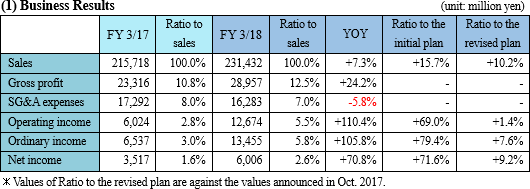 Sales and profits increased, exceeding the respective estimates.
Sales were 231.4 billion yen, up 7.3% year on year. Revenue from the sale of securities in the RISA Business's fund and the sale of healthcare-related real estate for sale in Other Business contributed.
Ordinary income was 13.5 billion yen, up 105.8% year on year. The RISA Business was strong, and there was increased income from dividends and interest in the Finance Business.
Performance surpassed both the initial plan and the revised plan (2nd revision) announced in Oct. 2017.
Additionally, as a result of increasing the term-end dividend from 22 yen/share to 28 yen/share, the revised total annual dividend was 50 yen/share (original forecast was 44 yen/share).
Sales and profits increased, exceeding the respective estimates.
Sales were 231.4 billion yen, up 7.3% year on year. Revenue from the sale of securities in the RISA Business's fund and the sale of healthcare-related real estate for sale in Other Business contributed.
Ordinary income was 13.5 billion yen, up 105.8% year on year. The RISA Business was strong, and there was increased income from dividends and interest in the Finance Business.
Performance surpassed both the initial plan and the revised plan (2nd revision) announced in Oct. 2017.
Additionally, as a result of increasing the term-end dividend from 22 yen/share to 28 yen/share, the revised total annual dividend was 50 yen/share (original forecast was 44 yen/share).
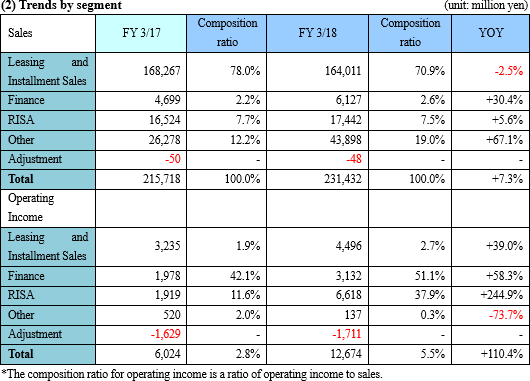
 Leasing and Installment Sales Business
Sales decreased, but profit grew.
In FY 2017, the market was sluggish, and the number of lease transactions in the industry as a whole decreased by 3.9% year on year. Lease transaction volume for the company's core information and communications devices also fell 0.3% year on year.
Operating income grew due to the posting of reversal of allowance for doubtful accounts, etc.
The total amount of contracts executed increased 22.6% year on year, due to orders for large-scale projects in public sectors and healthy performance in the private demand sector.
The total amount of contracts concluded also increased 11.9% year on year.
Leasing and Installment Sales Business
Sales decreased, but profit grew.
In FY 2017, the market was sluggish, and the number of lease transactions in the industry as a whole decreased by 3.9% year on year. Lease transaction volume for the company's core information and communications devices also fell 0.3% year on year.
Operating income grew due to the posting of reversal of allowance for doubtful accounts, etc.
The total amount of contracts executed increased 22.6% year on year, due to orders for large-scale projects in public sectors and healthy performance in the private demand sector.
The total amount of contracts concluded also increased 11.9% year on year.
 Finance Business
Sales and profit increased.
Sales grew due to increased income from dividends and interest. There was a rise in the provision of allowance for doubtful accounts, but profits increased.
Excluding bulk factoring, the total amount of contracts executed (by contract type) grew 31.0% year on year, due to orders for large-scale projects involving leasebacks and individual factoring.
In terms of industry-specific contract execution, amounts in the real estate industry declined, but the total amount across all industries grew, including orders for large-scale projects in the manufacturing industry. Total sales in the private demand sector rose 31.4% year on year.
Finance Business
Sales and profit increased.
Sales grew due to increased income from dividends and interest. There was a rise in the provision of allowance for doubtful accounts, but profits increased.
Excluding bulk factoring, the total amount of contracts executed (by contract type) grew 31.0% year on year, due to orders for large-scale projects involving leasebacks and individual factoring.
In terms of industry-specific contract execution, amounts in the real estate industry declined, but the total amount across all industries grew, including orders for large-scale projects in the manufacturing industry. Total sales in the private demand sector rose 31.4% year on year.
 RISA Business
Sales and profit increased.
(Asset Business)
Due to the large-scale sale of investment securities in the fund management business, sales and profit increased dramatically, more than two times from the previous term.
(Real estate)
As there was a large-scale project in the previous term, sales declined, but profit grew, due to greater commission income.
(Advisory)
Despite a decline in sales, profits remained almost the same as the previous term.
RISA Business
Sales and profit increased.
(Asset Business)
Due to the large-scale sale of investment securities in the fund management business, sales and profit increased dramatically, more than two times from the previous term.
(Real estate)
As there was a large-scale project in the previous term, sales declined, but profit grew, due to greater commission income.
(Advisory)
Despite a decline in sales, profits remained almost the same as the previous term.
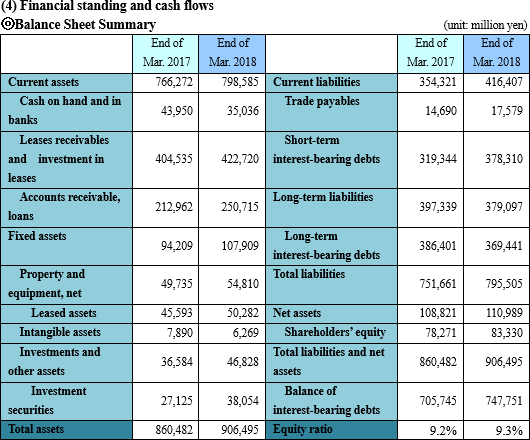 Total assets were 906.4 billion yen, up 46.0 billion yen from the end of the previous term, as leases receivables and investment, accounts receivable, loans and investment securities increased.
Liabilities were 795.5 billion yen, up 43.8 billion yen from the end of the previous term, due to the augmentation of interest-bearing debts. Net assets were 110.9 billion yen, up 2.1 billion yen from the end of the previous term.
Equity ratio was 9.3%, up 0.1% from the end of the previous term.
Total assets were 906.4 billion yen, up 46.0 billion yen from the end of the previous term, as leases receivables and investment, accounts receivable, loans and investment securities increased.
Liabilities were 795.5 billion yen, up 43.8 billion yen from the end of the previous term, due to the augmentation of interest-bearing debts. Net assets were 110.9 billion yen, up 2.1 billion yen from the end of the previous term.
Equity ratio was 9.3%, up 0.1% from the end of the previous term.
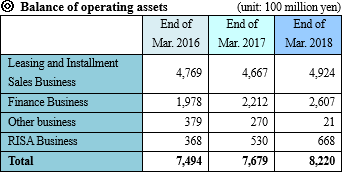 The public sector performed well, and the balance in the leasing and installment sales business grew. There were large-scale orders involving individual factoring and leasebacks in the Finance Business, and its balance also rose. Progress in the fund management business resulted in an increased balance of the RISA Business, but due to sales of the healthcare-related real estate, the balance of other business declined. Total balance was up 54.1 billion yen from the end of March last year.
◎ Situation of fund procurement
Fund procurement cost rate (fund procurement cost ÷ average balance of interest-bearing debts) fell by 0.05 points year on year to 0.63%, due to the low stability of short-term and medium-term market interest rates and the utilize of CP.
Direct procurement ratio, which is the ratio of CP, corporate bonds, and liquidation of receivables to total interest-bearing liabilities, increased from 33.9% at the end of the previous term to 39.0%, due to the growth of the balance of CP and corporate bonds.
The public sector performed well, and the balance in the leasing and installment sales business grew. There were large-scale orders involving individual factoring and leasebacks in the Finance Business, and its balance also rose. Progress in the fund management business resulted in an increased balance of the RISA Business, but due to sales of the healthcare-related real estate, the balance of other business declined. Total balance was up 54.1 billion yen from the end of March last year.
◎ Situation of fund procurement
Fund procurement cost rate (fund procurement cost ÷ average balance of interest-bearing debts) fell by 0.05 points year on year to 0.63%, due to the low stability of short-term and medium-term market interest rates and the utilize of CP.
Direct procurement ratio, which is the ratio of CP, corporate bonds, and liquidation of receivables to total interest-bearing liabilities, increased from 33.9% at the end of the previous term to 39.0%, due to the growth of the balance of CP and corporate bonds.
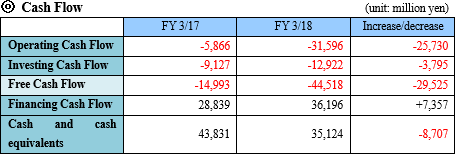 The deficit of operating cash flow augmented, due to an increase in operating loans and purchase of assets for lease.
The deficit of investing cash flow also grew due to increase in the purchase of investment securities.
Since there was no longer expenditure for redeeming corporate bonds posted in the previous term, the surplus of financing cash flow expanded.
The cash position declined.
(5) Topics
◎ Investment in a small, highly efficient wood biomass power plant which uses local materials
Together with a local enterprise, the company invested in a small-scale wood biomass power plant, the "Uchiko Biomass Power Plant," established by SymEnergy Inc. (Headquarters: Kobe, Hyogo Prefecture) in Uchiko-cho, Ehime Prefecture.
With an electricity generation of less than 2,000kW, the Uchiko Plant is the first small-scale commercial power plant in Shikoku. If construction proceeds steadily, it is expected to start generating electricity in Nov. 2018.
◎ Capital participation for actualizing a society with sustainable energy by expanding the hydrogen mobility field
In Mar. 2018, the company entered into an agreement regarding capital participation in "Japan H2 Mobility (hereinafter JHyM)," a hydrogen station network LLC. The agreement consists of four other companies: JA Mitsui Leasing Ltd., Sompo Japan Nipponkoa Insurance Inc., Sumitomo Mitsui Finance and Leasing Company, Limited and Mirai Creation Fund (operated by Sparks Group Co., Ltd.).
JHyM was established in Feb. 2018, based on Japan's "Basic Hydrogen Strategy" (decided by the Ministerial Conference on Renewable Energy and Hydrogen on Dec. 26, 2017). JHyM is a group of 11 companies that promote the installation of hydrogen stations and includes financial investors, automobile manufacturers, and infrastructure companies.
The main business involves contributing to the development, strategic placement, and efficient operation of hydrogen stations throughout Japan.
Together, the five companies will be involved in the spread of fuel cell vehicles, which is next generation automobiles, and green energy, as well as the use of ICT pertaining to hydrogen stations, safety verification, technological innovations, diversifying purchasing methods, etc. Each company is participating in JHyM with the goal of pooling their strengths to contribute to society.
As a result of this capital participation, and following the formation of a more robust consortium centered on JHyM, JHyM has implemented a cycle for positive growth, which includes "the strategic installation of hydrogen stations and support as an independent business," and "promoting the widespread use of fuel cell vehicles by improving user convenience." JHyM will work still harder toward the realization of a society with sustainable energy by expanding the hydrogen mobility field.
The deficit of operating cash flow augmented, due to an increase in operating loans and purchase of assets for lease.
The deficit of investing cash flow also grew due to increase in the purchase of investment securities.
Since there was no longer expenditure for redeeming corporate bonds posted in the previous term, the surplus of financing cash flow expanded.
The cash position declined.
(5) Topics
◎ Investment in a small, highly efficient wood biomass power plant which uses local materials
Together with a local enterprise, the company invested in a small-scale wood biomass power plant, the "Uchiko Biomass Power Plant," established by SymEnergy Inc. (Headquarters: Kobe, Hyogo Prefecture) in Uchiko-cho, Ehime Prefecture.
With an electricity generation of less than 2,000kW, the Uchiko Plant is the first small-scale commercial power plant in Shikoku. If construction proceeds steadily, it is expected to start generating electricity in Nov. 2018.
◎ Capital participation for actualizing a society with sustainable energy by expanding the hydrogen mobility field
In Mar. 2018, the company entered into an agreement regarding capital participation in "Japan H2 Mobility (hereinafter JHyM)," a hydrogen station network LLC. The agreement consists of four other companies: JA Mitsui Leasing Ltd., Sompo Japan Nipponkoa Insurance Inc., Sumitomo Mitsui Finance and Leasing Company, Limited and Mirai Creation Fund (operated by Sparks Group Co., Ltd.).
JHyM was established in Feb. 2018, based on Japan's "Basic Hydrogen Strategy" (decided by the Ministerial Conference on Renewable Energy and Hydrogen on Dec. 26, 2017). JHyM is a group of 11 companies that promote the installation of hydrogen stations and includes financial investors, automobile manufacturers, and infrastructure companies.
The main business involves contributing to the development, strategic placement, and efficient operation of hydrogen stations throughout Japan.
Together, the five companies will be involved in the spread of fuel cell vehicles, which is next generation automobiles, and green energy, as well as the use of ICT pertaining to hydrogen stations, safety verification, technological innovations, diversifying purchasing methods, etc. Each company is participating in JHyM with the goal of pooling their strengths to contribute to society.
As a result of this capital participation, and following the formation of a more robust consortium centered on JHyM, JHyM has implemented a cycle for positive growth, which includes "the strategic installation of hydrogen stations and support as an independent business," and "promoting the widespread use of fuel cell vehicles by improving user convenience." JHyM will work still harder toward the realization of a society with sustainable energy by expanding the hydrogen mobility field.
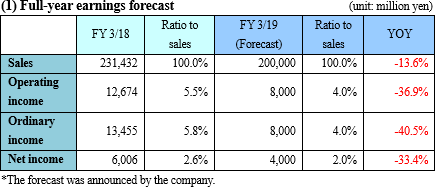 Sales and profit are estimated to decrease.
Due to the large-scale sale of real estate for sale in the previous term, sales are estimated to drop by 13.6% year on year to 200 billion yen.
Ordinary income is also expected to decrease 40.5% year on year to 8 billion yen, due to the sale of investment securities in the previous term, and the reversal of credit costs.
The dividend is forecasted to be 50 yen/share, unchanged from the previous term. The estimated payout ratio is 26.9%.
Sales and profit are estimated to decrease.
Due to the large-scale sale of real estate for sale in the previous term, sales are estimated to drop by 13.6% year on year to 200 billion yen.
Ordinary income is also expected to decrease 40.5% year on year to 8 billion yen, due to the sale of investment securities in the previous term, and the reversal of credit costs.
The dividend is forecasted to be 50 yen/share, unchanged from the previous term. The estimated payout ratio is 26.9%.
 <Development of new businesses>
The company will establish new, sustainable businesses, including ones not related to finance.
<Development of new businesses>
The company will establish new, sustainable businesses, including ones not related to finance.
 The company is focusing on new businesses in 4 fields: energy, healthcare, agriculture, and sightseeing.
<Strengthen corporate management supporting business strategies>
The company will strengthen the management foundation that supports business strategies.
The following progress was made.
The company is focusing on new businesses in 4 fields: energy, healthcare, agriculture, and sightseeing.
<Strengthen corporate management supporting business strategies>
The company will strengthen the management foundation that supports business strategies.
The following progress was made.
 Efforts to strengthen compliance, progress with programs to improve operating quality.
Efforts to strengthen compliance, progress with programs to improve operating quality.
 Begin work to reform work styles and encourage the participation and advancement of women to raise labor productivity and improve employee satisfaction.
Begin work to reform work styles and encourage the participation and advancement of women to raise labor productivity and improve employee satisfaction.
 Received "Eruboshi" certification (Grade 2) for its initiatives to promote the active participation and advancement of women.
Received "Eruboshi" certification (Grade 2) for its initiatives to promote the active participation and advancement of women.
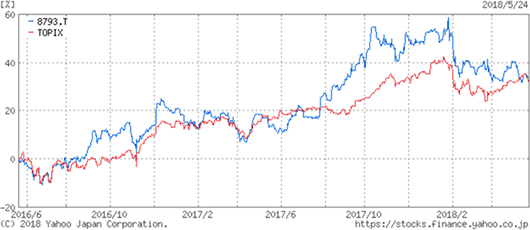
 Each measure progressed steadily, and the redevelopment of the base for core business and the design of strategies for new business bore some fruit.
Each measure progressed steadily, and the redevelopment of the base for core business and the design of strategies for new business bore some fruit.
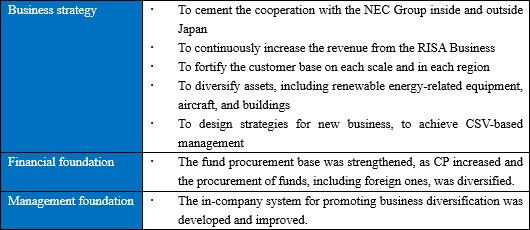 (2) Overview of the new Medium-term Plan 2017
This three-year period is recognized as "the period for 'completing core business domains' and 'launching new business for actualizing the vision.'"
① Business Strategies
<Completion of core business domains>
The company will pursue the lease business that can earn additional revenue, and strive to establish "services" which utilize the company's competitive advantage, while using the capabilities to combine a variety of services and inducing synergy inside and outside the company.
(2) Overview of the new Medium-term Plan 2017
This three-year period is recognized as "the period for 'completing core business domains' and 'launching new business for actualizing the vision.'"
① Business Strategies
<Completion of core business domains>
The company will pursue the lease business that can earn additional revenue, and strive to establish "services" which utilize the company's competitive advantage, while using the capabilities to combine a variety of services and inducing synergy inside and outside the company.
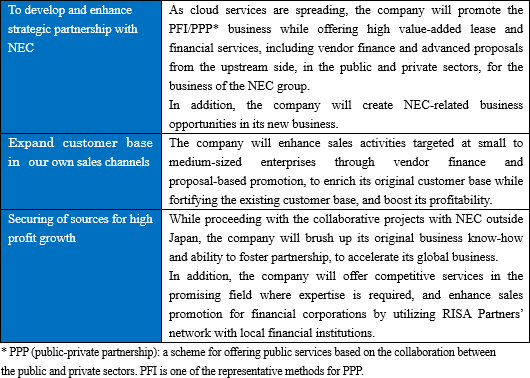 <Launch of new businesses>
The company will engage in business activities for tackling social issues, such as local revitalization and the decrease of the working population.
<Launch of new businesses>
The company will engage in business activities for tackling social issues, such as local revitalization and the decrease of the working population.
 The company will implement business strategies in the following 5 fields.
The company will implement business strategies in the following 5 fields.
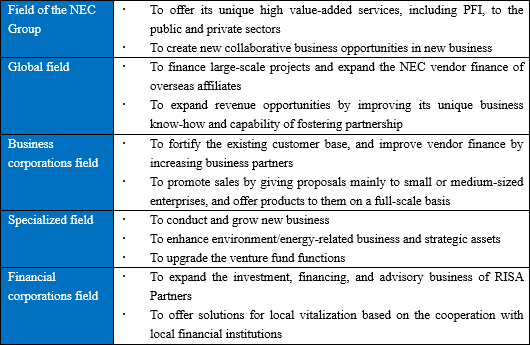 <Strategies for fortifying the management foundation>
The company will strengthen the management foundation that supports business strategies.
<Strategies for fortifying the management foundation>
The company will strengthen the management foundation that supports business strategies.

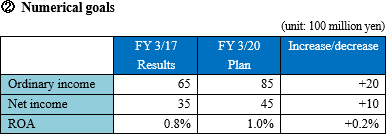 The company will produce good results by improving profitability, and increase profit steadily.
The company will produce good results by improving profitability, and increase profit steadily.
 ◎ Corporate Governance Report
Last update date: Jun. 30, 2017
<Reasons for Non-compliance with the Principles of the Corporate Governance Code (Excerpts)>
It is mentioned that "We follow all of the principles of the Corporate Governance Code."
<Disclosure Based on the Principles of the Corporate Governance Code (Excerpts)>
◎ Corporate Governance Report
Last update date: Jun. 30, 2017
<Reasons for Non-compliance with the Principles of the Corporate Governance Code (Excerpts)>
It is mentioned that "We follow all of the principles of the Corporate Governance Code."
<Disclosure Based on the Principles of the Corporate Governance Code (Excerpts)>
